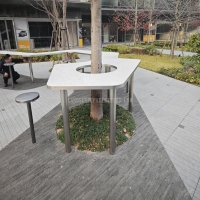Welcome to the website for landscape facilities products and knowledge.
What are the most sustainable practices for disposing of or recycling old landscape bar counters?
When outdoor living spaces undergo renovations, the question of how to responsibly handle old landscape bar counters becomes increasingly important in our environmentally conscious world. These substantial structures, often made from various materials including wood, stone, composite materials, or concrete, present unique challenges and opportunities for sustainable disposal and recycling.
The most environmentally responsible approach begins with assessing the possibility of repurposing. A well-constructed bar counter might find new life in a different area of your property as a potting bench, garden workstation, or even transformed into unique outdoor seating. Creative repurposing not only prevents waste but adds character to your landscape while reducing the environmental impact of manufacturing new materials.
For counters made from natural stone or high-quality wood, deconstruction and reuse offer excellent sustainable options. These materials can be carefully dismantled and utilized in other projects, such as creating garden pathways, retaining walls, or incorporated into new landscaping features. This approach preserves the embodied energy already invested in these materials and avoids the carbon footprint associated with manufacturing and transporting new products.
When repurposing isn't feasible, responsible recycling becomes the next best option. Different materials require distinct recycling approaches: wood can often be chipped for mulch or biomass fuel; metals can be sorted and sent to specialized recycling facilities; concrete and stone may be crushed for use as aggregate in construction projects; while composite materials might require specialized recycling processes available through manufacturer take-back programs or dedicated recycling facilities.
For those unable to reuse or recycle locally, several eco-conscious disposal methods exist. Donating to architectural salvage yards, community gardens, or local building material reuse organizations extends the life of these materials. Some specialized recycling facilities now accept mixed construction materials, sorting them for optimal recycling outcomes. Additionally, exploring artist communities or maker spaces might reveal creative individuals seeking such materials for their projects.
Ultimately, the most sustainable practice involves considering the entire lifecycle of outdoor furniture before purchase. Opting for modular designs, choosing materials with established recycling pathways, and selecting durable products that will last for years all contribute to reducing future waste. By adopting these sustainable practices for disposing of or recycling old landscape bar counters, we not only minimize environmental impact but also contribute to a circular economy that values resources and reduces landfill burden.
Related search:

Recommendation
An outdoor bar counter with stainless steel and terrazzo materials in an irregular shape